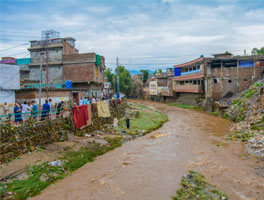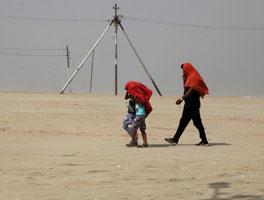 |
Dear readers,
Welcome to the Climate Weekly newsletter by the Centre for Science and Environment’s Climate Change Programme and Down to Earth.
Heat is once again in focus. 13 Indian States and one Union territory have faced heatwaves since March 3, writes DTE’s Akshit Sangomla. The UN’s climate science body, the IPCC, stated “unequivocally” in 2021 that human activities are causing global warming, which is worsening the frequency and intensity of extreme weather events like heatwaves.
The World Meteorological Organization – a body older than the IPCC – said last week that in 2022 the planet was 1.15 C warmer, on average, than it was in the period between 1850-1900 (often called the preindustrial period). The years 2015-2022 were the eight warmest since 1850, says the WMO, as DTE’s Rohini Krishnamurthy highlights. This is despite three years of a weather phenomenon known as La Niña, during which global temperatures tend to be lower. We are now heading into the El Niño, the opposite phase, which tends to be warmer and generally causes more intense heatwaves in India, as it did in 2015 and 2016.
You can also watch Rohini’s video explainer this week on flash droughts.
There is a lot of noise around carbon markets, and this week CSE’s Trishant Dev maps out some of the actors in the voluntary carbon market – a worrying observation is the growing influence of intermediaries involved in the chain, each of whom claims a cut of the proceeds in any transaction.
And some interesting trivia relevant for climate politics observers: Western countries that banned Russian oil imports have instead imported oil commodities worth €42 billion since the war started, from places like Indiathat import Russian crude, leading to the term “laundromats”.
|
|
 |
| |
 |
|
| |
 |
 |
| |
By — Avantika Goswami
Climate Change, CSE |
| |
|
 |
|
|
| |
 |
|
| |
| EXTREME WEATHER TRACKER |
| |
Climate change worsened extreme weather events in 2022: State of the Global Climate report, 21 April 2023
|
 |
 |
|
|
| |
 |
|
| |
 |
 |
A looming El Nino may bring more heatwaves in India, 21 April 2023
|
|
|
| |
 |
|
| |
|
|
| |
|
|
| |
|
|
| |
 |
|
| |
CLIMATE NEWS | SCIENCE| IMPACTS| POLITICS |
|
| |
 |
|
| |
|
|
| |
 |
|
| |
|
|
| |
 |
|
| |
|
|
| |
 |
|
| |
|
|
| |
 |
|
| |
|
|
| |
 |
|
| |
|
|
| |
 |
|
| |
|
|
| |
 |
|
| |
|
|
| |
 |
|
| |
|
|
| |
 |
|
| |
|
|
| |
 |
|
| |
|
|
| |
 |
|
| |
|
|
| |
|
|